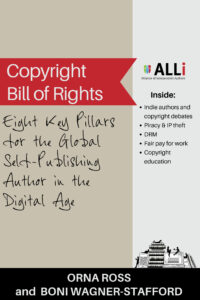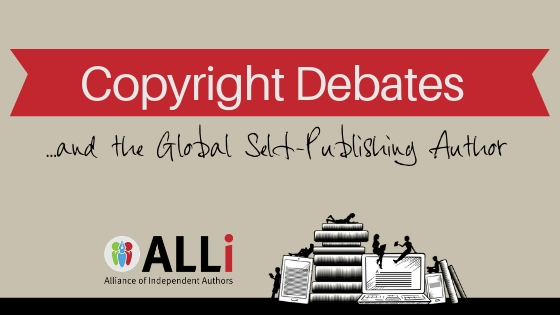
ALLi continues to work on development of its Copyright Bill of Rights (working title) for the global self-published author in the digital age. ALLi Founder and Director Orna Ross and Communications Manager Boni Wagner-Stafford share this excerpt from their draft and forthcoming Copyright Bill of Rights book discussing independent authors and copyright.
Copyright is a passive right; its benefit is in the fact that it exists, that the principle of ownership and the right to share in any accruing income has been given the stamp of law. Under that law, authors trade in their rights to produce and sell books and other content in a variety of formats (ebook, print audio) and languages, on a wide range of distribution platforms, and can also license or permanently transfer or assign their rights to others.

That copyright has real and significant value can be seen in how it is increasingly warred over by three large competing interests.
Big Tech: Internet publishing platforms like Google, Facebook and Amazon that authors use to publish and/or promote books.
Big Content: global media corporations like Penguin Random House, News International and Hollywood to whom authors licence or sometimes assign publishing rights. Here we also find large self-publishing services like Author Solutions, some of whom grab rights as well as charging service fees.
Big Legal: Large legislating territories and blocks like the USA or the European Union who aim to modify the power of big tech and big media.
None of these speak for independent authors. Neither do publishers, agents nor the various literary and publishing organizations that have entered the debate, including author representative bodies.
Conflicting Copyright Needs
 The copyright needs of an Internet tech giant like Google, Facebook, or YouTube; a social media company like Twitter or LinkedIn, a news organization like The Guardian or New York Times, a traditional publishing house like Random House or Penguin, a literary agency or a legislative body or even a traditionally published author or authors’ representative body may not align with the copyright needs of the independent author.
The copyright needs of an Internet tech giant like Google, Facebook, or YouTube; a social media company like Twitter or LinkedIn, a news organization like The Guardian or New York Times, a traditional publishing house like Random House or Penguin, a literary agency or a legislative body or even a traditionally published author or authors’ representative body may not align with the copyright needs of the independent author.
Of course many publishing and self-publishing companies have individual employees and even owners who care about writers. ALLi, and ALLi members, successfully and happily engage with such company representatives on a daily basis, but the wise author operates within the knowledge that companies, as companies, have a duty to act for their shareholders. And that literary and publishing organizations may not understand the needs of the self-publisher.
On many issues, independent authors find they have more in common with creative entrepreneurs in other sectors like art, tech and education than with authors who publish exclusively through the traditional model and agent-publisher-wholesaler-bookstore supply chain.
Our copyright deliberations to date have revealed that many interested parties, including some authors and author associations, do not understand the self-publishing trading environment: how self-published books are bought, sold, read and promoted.
The Copyright Wars
There is a great deal of misinformation about self-publishing circulating in literary, publishing and creative industries, and the associated trade bodies and governmental organizations who engage with them. And within the self-publishing community itself, indie authors take many different approaches and hold widely varying opinions about copyright issues like piracy, plagiarism and digital rights management.
 Against this background, ALLi advocates for the individual, independent, self-publishing author. It is our responsibility and our honor to put forward the issues that independent, self-publishing authors face in the course of doing their work and running their businesses.
Against this background, ALLi advocates for the individual, independent, self-publishing author. It is our responsibility and our honor to put forward the issues that independent, self-publishing authors face in the course of doing their work and running their businesses.
No issue is more fundamental than copyright.
No issue is more fundamental than #copyright for #indieauthors Share on X
We are concerned some changes—proposed and adopted—which purport to be “updating and improving” copyright law for the digital age, have not considered the full implications for independent authors and their readers.
To broadly summarize: on one side, we have copyright activists and author representative bodies who argue, in the words of the UK Society of Authors (SoA):
…sharing illegal copies for free online means publishers lose out on sales and authors lose out on royalties. It also leads to a decline in the perceived value of a book.
– UK Society of Authors “Where We Stand”
For these copyright activists, file sharing is theft, as SoA Chair and world-renowned trade-published author, Philip Pullman, has put it: “…as surely as reaching into someone’s pocket and taking their wallet is theft.”
EU's Copyright Directive
Traditional authors associations have keenly supported the passing of a recent EU Directive in its stated aim of addressing the “big tech value gap” between the revenues earned by companies like Facebook, YouTube and Amazon that host copyright works and the money received by authors and performers who create those works.
It seems reasonable.
But others question the wisdom of trying to impose a 20th-century exclusive-rights style copyright regime on individual authors and readers in the 21st century, particularly when it leads to a decrease in freedoms like free expression and free sharing.
This alternative view has been well articulated by the “copy left,” or “free culture movement.” This diverse group of activists, artists, lawyers and scholars sees copyright as a threat to placed on open Internet access and file sharing and the consequent wave of innovation this free-sharing environment has been unleashed.
What it sees as excessive legal restrictions endangers many initiatives, from crowdsourced “read-write websites” like Wikipedia, to authors writing within another author’s fictional world. They oppose attempts to cordon of copyrighted material (digital rights management) as ineffective and ideologically unsound.
They argue for the individual author’s right to set their own rights terms in Creative Commons agreements and contend that, counter-intuitively, evidence indicates that piracy does not, in fact, have a derogatory effect on author income.
Independent Authors and Copyright
The experiences of self-publishers sheds new light on some of these debates and needs to be considered and weighed in copyright debate and policy, particularly by those who purport to speak on their behalf.
We urge interested parties from all sides of this debate—including authors themselves—to better understand the trading environment and challenges of the self-publishing author.
And how copyright policy environment and its implementation directly affects their ability to earn a living and contribute to the fabric of society.
For example:
• Authors today are publishers and business owners, not freelance content providers.
• The digital e-commerce platforms (big tech) so widely disparaged by copyright activists are the means by which most self-publishing authors make a living.
• Copyright legislators, governments and most literary bodies think territorially, within legislative jurisdictions, but independent authors think globally. Independent authors who live, write, publish and claim copyright in one territory are selling to, and interacting with, readers and potential readers worldwide, through the internet.
• Author-publishers may choose to offer their work freely and consider themselves to be working in “the gift economy”, employing free sharing for ideological reasons, or freemium models that ultimately generate a profit.
• Digital Rights Management technology is useless in practice and most indie authors consider it an infringement on reader rights and choose not to employ it.
• Tech companies are not all made equal. There is a vast difference between how Amazon, Kobo and Ingram Spark treat authors and other creators when compared to YouTube, Facebook or Google Books. Too little credit has been given to these publishing tech companies who—while not perfect— have succeeded in devising a payment policy that is allowing many authors to earn a living from self-publishing.
• Creative commons, whereby authors devise their own sharing licences, with individual terms has been overlooked.
• New technologies like AI and the blockchain are fast coming on track, with the power to shift economies, businesses and behaviors and how authors trade, all over again, reconfiguring digital text, books and media, legal agreements, monetization of content, and payment methods to maximize the value of the authors’ intellectual property and moral and monetary rights.
Understanding this fast-changing landscape is challenging for authors and creative industry bodies. But without a realistic assessment of how author-publishers work and trade and negotiate, and how books are discovered, bought and read, we may inadvertently harm the very population we are trying to help.







We need all the information on copyrights we can get, that’s for sure. I’d like to bring up a point of book contracts with small indie houses. My publisher is a small indie house (an LLC), a good one and fulfills the high standards of professionalism. Recently, the sole owner passed away. No one else in the LLC was named as power of attorney or executive or has authority in the company. So, what happens to my copyrights for my novels now that the company is going to dissolve? I am in a struggle to find out how I can get my copyrights back from a company that is in the arduous process of dissolving via probate court. No royalties are being paid, and I expect that my novels will go out of print at some point. If I want to look for a reprint publisher, I have to make sure my copyrights have reverted back to me. Clauses in book contracts regarding reversion of copyright back to the author are really important. It’s something I had not thought of at all. So, my lesson learned on all of this is to make sure there is a clause in the contract that if the sole owner of the company no longer functions or exists to operate the publishing company, all copyrights automatically revert back to the author.